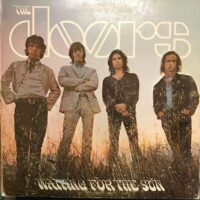
Waiting For The Sun is the Goats Head Soup of the Doors’ catalog. It followed their two most beloved albums—The Doors and Strange Days—and was considered a letdown by most critics and fans upon its 1968 release. Nevertheless, it reached the top of Billboard‘s LP chart. But, as with Goats Head Soup (which had the difficult task of following Sticky Fingers and Exile On Main St.), time has been kind to Waiting For The Sun. Over the decades, the deep tracks on both records have risen in esteem and they’ve proved to be some of the best work by both groups. (Read our review of Goats Head Soup here.)
You can’t say that Waiting For The Sun lacks range. This album contains “Love Street”‘s feathery, filigreed, and quaint romantic pop that threatens to float right off the grooves and “Five To One,” perhaps the toughest and most ominous Doors song—which is saying something in a catalog that boasts “The End” and “Horse Latitudes.” Hip-hop stars J Dilla and Jay-Z and Plunderphonics prankster John Oswald all sampled “Five To One,” which provides a helluva climax for Waiting For The Sun.
Waiting For The Sun also possesses the Robby Krieger-dominated “Spanish Caravan,” in which the guitarist flexes his considerable flamenco chops. The melody eventually gets as convoluted and bombastic as anything ELP or Yes would do a few years later. Then you have “My Wild Love,” which is constructed like a work song, with backing chants, claps, and stomps. Like it or not, there were very few tracks that sounded like this on rock records of the time—especially on those released by major labels.
You got “Yes, The River Knows,” an intimate jazz-pop beauty, not unlike Tim Buckley ca. Blue Afternoon. and also the relentless earworm of big hit “Hello, I Love You.” Bizarrely, the Doors may have unknowingly blueprinted a strain of synth-pop on “Hello, I Love You,” with its sassy automaton shuffle. Yes, the rhythm resembles that of the Kinks’ “All Day And All Of The Night,” but Manzarek’s keyboard drives it instead of distorted guitars and it’s stiffer in the joints, and that makes all the difference. This development was concurrent with Silver Apples’ first LP, which also foreshadowed synth-pop, but in a more blatant manner. “Hello, I Love You” also possess the coolest sound on any Doors record—those three seconds of futuristic, spaced-dusted keyboard wizardry at 1:16.
I have a fondness for the maligned “Summer’s Almost Gone,” because of how it foreshadows Opal‘s “Happy Nightmare Baby.” A swaying, wistful ballad about romantic doubt and confusion, “Summer’s Almost Gone” features Krieger’s bottleneck-guitar sighs sailing over Manzarek’s Ramsey Lewis-esque keyboard curlicues. Less successful is “Wintertime Love”‘s baroque, waltz-time puffery that’s somewhat similar to Love’s “Stepanie Knows Who,” but with much less thrust and excitement.
If you dig sophisticated, multi-part anti-war tunes, “The Unknown Soldier”—which peaked at #39 with a bullet—is the bomb. “Not To Touch The Earth” stands as one of the Doors’ eeriest, most suspenseful, and psychedelic tracks. Krieger forges a mesmerizing guitar motif while Manzarek creates a proto-Suicide throb that intensifies throughout the song. Despite reports of him being a drunken mess for these sessions, Jim Morrison roars at his most portentous and croons at his most suave. The coda is almost as nerve-shattering as that of King Crimson’s “21st Century Schizoid Man.” When people diss the Doors, I like to counter with “But have you heard ‘Not To Touch The Earth'”? If that doesn’t convince ’em of the Doors’ worth, nothing probably will.
I get it: some listeners have trouble with Morrison’s try-hard “poetic” lyrics and self-serious demeanor. But I filter out most of that noise and enjoy Mr. Mojo Risin strictly as a disruptive performance artist who’s competing for attention with the exceptional music behind him. More often than not, Jimbo rises to the occasion and—bonus!—sometimes delivers unintentional humor. -Buckley Mayfield
Located in Seattle’s Fremont neighborhood, Jive Time is always looking to buy your unwanted records (provided they are in good condition) or offer credit for trade. We also buy record collections.


